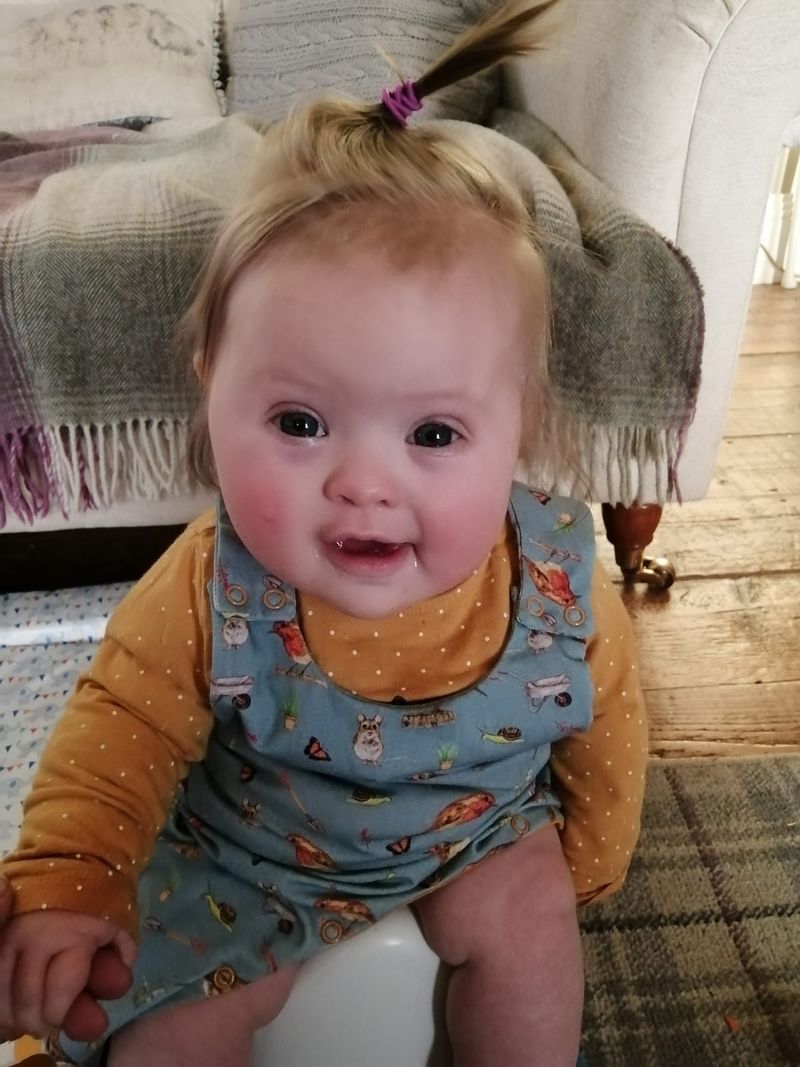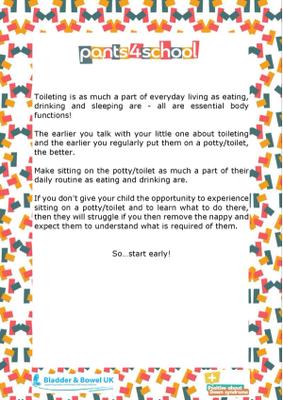
Get the Potty Out!
You may have seen constipation crop up on that ‘list’ of possible health conditions that you are presented with when given a diagnosis. You may spiral into a Google-vortex and come out with fears that your child will have Hirschsprung's, will need to have a stoma fitted, or is looking forward to a life on laxatives. Ok, so some of those things are possible. But I wouldn’t let yourself believe that they are likely. And even if your child does have complications with their bowel (as with most health ‘issues’ our kids might have) these things are treatable and generally there are frequent assessments to highlight any issues allowing you to address them quickly. Also, remember they are all things that can happen to a typical child too, but our kids will be more closely monitored for them.
I’d generally want to avoid an over-medicalisation of something, which could result in an unnecessary journey of clinical prodding, poking and intervention. But sometimes that is the only route to giving your child comfort and keeping them well. So always take medical advice if you are unsure about anything.
But what if it could be a simple action that we support our child to take that could help them whilst you wait for a referral, just in case there might be something that isn’t clinical that can resolve whatever the issue is? I’ve recently discovered one of those things and my mind has been blown.
One of the times to keep an eye on constipation for babies with Down Syndrome is when solids are introduced. So at (very nearly) 6 months old, and after a week of Frida trying a few solids, this is now on my watch list.
Frida has been under the care of the surgical team at Bristol Children’s Hospital since the grand age of 48 hours because she did not have a poo within those first golden hours.
Because she has Down Syndrome and because of what is known about the higher chance of having complications with her bowel, the referral was made quickly and it was taken seriously. There was concern that she may have Hirschprung's, or imperforate anus, both of which could require immediate surgical attention. I would recommend looking at a book for what to look out for here, or even better, speaking with a paediatrician because Dr Google can get a few things wrong and send you into that vortex you’d be better to avoid. Frida didn’t have either, but there are also a few other issues babies with DS may be more likely to have than typical babies. Constipation due to hypotonia (low muscle tone) in the colon is one such issue.
Being under their care meant that she got reviewed very early on, even though by the time she was reviewed at around 72 hours old, she’d done her first poo and had barely stopped since... they offered a follow-up appointment which I gladly accepted so I didn’t have to worry about any dodgy movements (or lack thereof). I knew I’d be able to make a note and discuss them with the clinicians if necessary and I had a direct route to a professional who had already seen her in case of an emergency. We were seen at the hospital in December and other than the Registrar slipping in a pesky ‘high risk’ as opposed to ‘high chance’ when discussing our history (I politely corrected her) it was a good appointment with no concerns noted and we were sent off for another few months on the basis that things might change around the time she starts eating solids.
Fast forward a month and Frida and some of her mates are now in the weaning zone. We started her on some baby rice a couple of weeks ago so she could get some early practice in dealing with a thicker consistency of food. She picked it up super quick and almost instantly her poos went from once a day to once every three. This is exactly what happened with Ada so we weren’t worried and she fell comfortably into the new pattern.
One of her friends, Daisy, the gorgeous girl in the photo above, which her parents have kindly agreed for me to use, is about a month older and started to eat solids a few weeks before Frida.
Her mum Scye shared her experience with me:
Daisy has recently started eating solids and has suffered with what seems like stomach pain and I think she is quite constipated.
Daisy would struggle to go when she was only on breast milk so I wonder if she's got some hypotonia of her colon. It was quite bad when she was 5 and a half months old and her paediatrician suggested I started her on food. That initially helped massively but since adding in more bulky things like Weetabix she's had a huge setback. Whilst waiting to hear from her paediatrician with any advice, I wanted to be able to do something to relieve her so I asked on the Positive About Down Syndrome group and got lots of advice almost immediately. Someone suggested setting them on the potty and amazingly that worked. As soon as I set her on it she passed a few really hard poos. Just horrible watching her be uncomfortable and I think that's what's been unsettling her sleep too.
I was absolutely amazed, she looked like she was relieved that I'd finally put her in the right position and tried with all her might to push some out! I'll definitely be trying her on it regularly now.
Since Scye shared that experience, Daisy now does all of her poos on the potty and has returned to being her happy self. This has the added bonus that they have avoided going down a medical route.
The ‘potty trick’ really does work. Around the time that Scye told us about it, Frida had started to look like she might need a little help on day 3. So I sat her on the potty. The first time she thought it was great fun and tried to stand up. She found this hilarious as she kept bouncing up and down on the potty and consequently gave me her biggest laugh to date - a happy insight into her very cheeky personality that is developing!!!
Over the last week since popping her on the potty twice a day she has used it to great effect!
I know I talk about PADS a lot in my posts but the amount of information we get is just phenomenal and I do worry that if we were just being advised by the professionals involved, Dr Google and the odd book, we may never have known how simple it was to give our girls a bit of comfort.
It is actually recommended that we start to sit our babies on the potty from around 9 months, or whenever they start showing strength in a sitting position. I don’t want to go into that here, but highly recommend making a note to look into this at the right time, because making an early start with our babies seems to be the key to unlocking their huge potential.
I leave this post with a note from ‘PANTS 4 SCHOOL’ an initiative set up by the wonderful Nicola Enoch from ‘PADS’ and Bladder and Bowel UK. Please do get onto the PADS groups and when the time comes, at around 6 months old, pop across to ‘DSUK Going POTTY! Toilet training advice for children under 5 with Down Syndrome’ to start looking at the advice around potty training. It means you can start to integrate it into your routine from an early age, which will ensure that when the time comes, all the groundwork for moving to using the toilet will have been done.

Remember I am not a medical professional. Remember I am only writing from my experience and the experiences of others close to me. As I’ve said before, read enough to be in a position to flag up any concerns you might have with a clinician, but don’t obsess until you know anything for sure. And even then try not to worry unnecessarily because there will always be a plan and generally, that plan will result in a workable solution for you and your child. There will also be a huge community of fantastic people alongside you to give you strength, ideas, the benefit of their experience, and their love.
And in the meantime - when in doubt – get the potty out!
